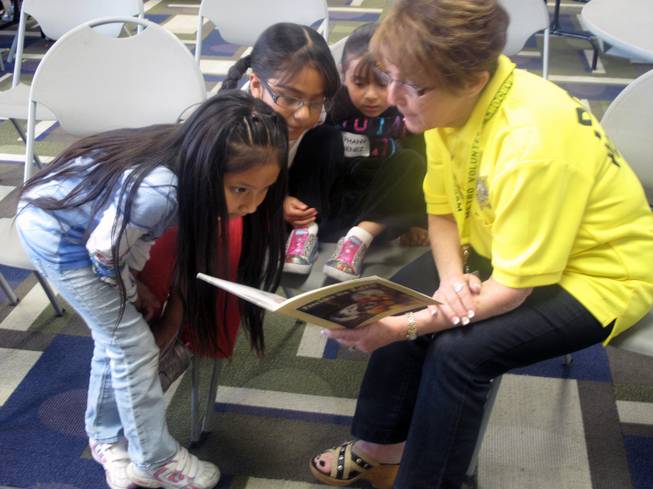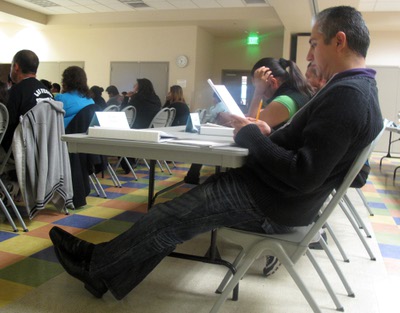
A Metro Police volunteer reads to children whose parents are attending the Hispanic Citizens Academy at the Pearson Community Center. Childcare is provided during the academy, which provides police an opportunity to foster good relationships with Hispanic children.
Friday, April 8, 2011 | 2:05 a.m.
Home News
All it took was a smile and hello to brighten North Las Vegas Police officer Chasity Smith’s day.
The cheery greeting resonated because it signaled to her something greater — the start of a positive relationship between law enforcement and the Hispanic community.
The man extending the greeting is participating in a Hispanic Citizens Academy, a Metro Police program that’s soon expanding to North Las Vegas.
The Spanish-speaking program aims to “break the barrier down among everyone” by opening a line of communication between the historically police-fearful Hispanic community and law enforcement, said Metro Lt. George Castro, who began the program in September 2007.
“It definitely makes a big difference, because now they see us and they approach us,” said Smith, one of several North Las Vegas officers training to bring the program to their city.
A total of 51 Hispanic citizens began class Wednesday evening at the Pearson Community Center by reciting the Pledge of Allegiance before settling down to learn about narcotics and Metro’s VICE team.
Across the hall, 15 children whose parents were attending the academy played under the supervision of Metro volunteers and participated in a lesson of their own from Mr. Safe-T.
The setup is all part of the plan. By involving children, authorities hope to preempt fears and negative views of the police — to, in essence, become friends instead of foes.
“This is our future right here,” Castro said as he watched the children play. “Someday, one of them will be protecting us.”
He would know. The son of Cuban immigrants, Castro grew up in Las Vegas’ Hispanic community before serving a stint in the military and attending the College of Southern Nevada and UNLV. Today, he is with Metro’s violent crimes section.
“For someone to say that an opportunity for advancement is limited in Las Vegas, that’s not true,” he said.
As the Hispanic population in Clark County has climbed — now at 29 percent, according to the 2010 Census — Castro said he developed the Hispanic Citizens Academy to offer a service previously unavailable to the community.
The Spanish-speaking program mirrors the standard Citizens Police Academy, except that it doesn’t include jail visits, police ride-alongs or coverage of police tactics, because of its “no-questions-asked” policy. That means participants don’t have to prove legal citizenship, Castro said.
Police want to use the academy to inform Hispanic citizens about their rights and generate more crime reports and tips from a community often hesitant to approach law enforcement officials.
“That’s the whole thing — the suspicions of us being here to arrest them,” Castro said. “Those are all experiences they had in other countries. They’re bringing those thoughts and ideas here.”
The final class focuses on how Hispanic immigrants can remain here legally, whether permanently or temporarily, without enduring scams in the process.
“We want them to know, don’t go to people fraudulently taking your money,” Castro said.
For instance, Castro warned students Wednesday evening about bodegas or convenience stores in Hispanic neighborhoods that might try to sell prescription medicine and over-the-counter drugs to illegal immigrants who don’t have medical insurance for their families. Last year, police dismantled two back-door operations fraudulently selling medications, which were often expired or not stored in proper temperatures, he said.
Since the debut of the academy, about 260 people have graduated from the program taught by Spanish-speaking officers who volunteer to participate, Castro said.
Metro Police rotate the location of each Hispanic Citizens Academy in hopes of reaching various pockets of the community.
Miriam Hickerson attended a previous academy with her 4-year-old daughter, Sasha, but they decided to come again to learn about new topics.
“It’s important for my community to be a part of the team,” said Hickerson, who encouraged friends to attend.
A stronger alumni group is a trend Castro would like to see among graduates of the Hispanic Citizens Academy.
“That’s the weakness of this whole program,” he said.
A more cohesive alumni group would be able to spread helpful information within the Hispanic community and decrease the number of crime victims, Castro said.
“They get important information and knowledge that can be immediately applied whether it’s to themselves, a family member or a friend,” he said.
North Las Vegas Police spokeswoman Chrissie Coon said the department’s officers would train under the guidance of Metro Police at two academies before launching a separate program in North Las Vegas.
“As a police department, we recognize the importance of that community,” she said.


Join the Discussion:
Check this out for a full explanation of our conversion to the LiveFyre commenting system and instructions on how to sign up for an account.
Full comments policy